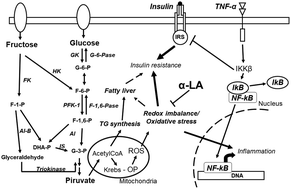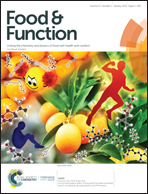Alpha-lipoic acid and its protective role in fructose induced endocrine-metabolic disturbances
Abstract
In recent decades a worldwide increase has been reported in the consumption of unhealthy high calorie diets associated with marked changes in meal nutrient composition, such as a higher intake of refined carbohydrates, which leads to the speculatation that changes in food habits have contributed to the current epidemic of obesity and type 2 diabetes. Among these refined carbohydrates, fructose has been deeply investigated and murine models of high fructose diet have emerged as useful tools to study dietary-induced insulin resistance, impaired glucose tolerance, dyslipidemia and alterations in glucose metabolism. Since oxidative stress has been demonstrated to play a key pathogenic role in the alterations described above, several lines of research have focused on the possible preventive effects of antioxidant/redox state regulation therapy, among which alpha-lipoic acid has been extensively investigated. The following references discussed support the fact that co-administration of alpha-lipoic acid normalized the changes generated by fructose rich diets, thereby making this compound a good therapeutic tool, also administered as a food supplement, to prevent endocrine–metabolic disturbances triggered by high fructose associated with obesity and type 2 diabetes at an early stage of development (prediabetes).



 Please wait while we load your content...
Please wait while we load your content...